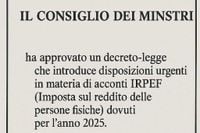On April 22, 2025, the Italian Council of Ministers approved a decree law that will significantly impact employees and pensioners in Italy by eliminating the requirement for them to pay any advance payments on personal income tax (IRPEF) for the year 2025. This decision comes as part of urgent provisions aimed at clarifying the regulations surrounding IRPEF advance payments, ensuring that the tax burden does not increase for the most vulnerable segments of the population.
The decree law, titled 'Urgent Provisions Regarding IRPEF Advance Payments Due for the Year 2025,' introduces essential coordination rules between the legislative decree 216 of 2023 and the 2025 budget law. Deputy Minister of Economy and Finance, Maurizio Leo, emphasized the importance of this measure, stating that it corrects a previous lack of alignment in the tax legislation that could have resulted in unintended financial burdens for workers and retirees. "The new provision confirms that employees and pensioners without additional income will not have to pay any IRPEF advance for 2025, avoiding any increase in the tax burden," Leo explained.
In recent weeks, concerns had been raised by various tax assistance centers (CAF) and labor unions about the potential for increased tax liabilities due to misinterpretations of the tax regulations. Specifically, they noted that the previous legislation had set forth a temporary reduction of IRPEF rates from four to three for 2024 only, which could have left many taxpayers confused about their obligations for the upcoming year. The recent decree aims to clarify these rules and ensure that the new, simplified tax rates are applied correctly.
Leo further clarified, "This intervention was necessary to correct a defect of coordination between the legislative decree of 2023, which only reduced the IRPEF rates for 2024, and the 2025 budget law that made this reduction structural." This means that the new tax structure will be in place moving forward, alleviating concerns that employees and pensioners would be subjected to higher advance payments based on outdated tax brackets.
Giovanni Angileri, president of Caf Uil, expressed satisfaction with the government's decision, stating, "This is an important measure that goes in the right direction: protecting the most exposed taxpayers who are often burdened by obligations that do not reflect their actual financial capacity." Angileri also pointed out that the absence of a timely clarification had previously created operational difficulties for both taxpayers and tax assistance centers.
As part of the new regulations, the IRPEF advances for 2025 will now be calculated based on the three current tax rates, rather than the previous four. This change is expected to simplify the tax filing process for millions of Italians and is particularly timely as the Revenue Agency prepares to release pre-filled tax declarations by the end of April 2025.
Moreover, the decree law introduces an increase in resources amounting to 245.5 million euros for the year 2026, which will be funded through adjustments to the 2024 budget. This financial planning aims to ensure that the new tax measures are sustainable and do not lead to unforeseen deficits in public finances.
Despite the positive reception of the decree, some CAF representatives have cautioned about ongoing issues that remain unaddressed. Christian Ferrari, a confederal secretary of Cgil, noted that while the decree resolves the immediate concerns regarding IRPEF advances, there are still significant challenges for low-income earners who are facing financial strain due to recent changes in tax policy. He urged the government to take further action to address these disparities, particularly for those earning between 8,500 and 9,000 euros annually, who have been adversely affected by the current fiscal framework.
The government’s swift response to the concerns raised by various stakeholders demonstrates a commitment to ensuring that the tax system is fair and equitable for all citizens. By eliminating the advance payment requirements for employees and pensioners without additional income, the administration seeks to provide relief to those who are most affected by the economic challenges of the post-pandemic recovery.
As Italy moves forward in implementing these tax reforms, the focus will remain on maintaining clarity and consistency in tax regulations, ensuring that all taxpayers understand their obligations and rights under the new system. This proactive approach is essential for fostering trust in the government’s ability to manage fiscal policy effectively and equitably.
Overall, the approval of the decree law on April 22 marks a significant step towards simplifying tax obligations for many Italians, while also addressing the pressing need for clarity in the face of evolving tax legislation. It reflects a broader trend of governmental responsiveness to the needs of citizens, particularly in challenging economic times.









